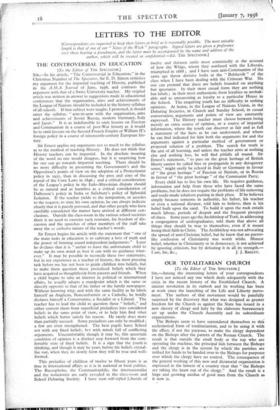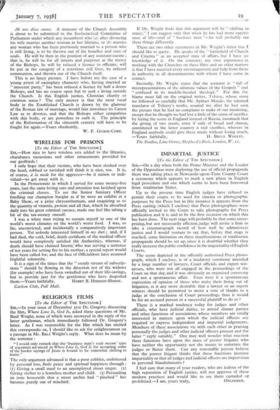OUR TOTALITARIAN CHURCH
[To the Editor of THE SPECTATOR.] SIR,—Among the interesting letters of your correspondents I have not noticed any one which deals adequately with the crisis in the recent history of the Established Church. A sinister revolution in its outlook and its working has been at work since the launching of the Life and Liberty move- ment. The authors of that movement would be painfully surprised by the discovery that what was designed as greater freedom for the Church as against the State has issued in a new slavery of clergy and laity by the elaborate bureaucracy set up under the Church Assembly and its subordinate organisations.
The Bishops seem to have surrendered themselves to this ecclesiastical form of totalitarianism, and to be using it with the effect, if not the purpose, to make the clergy dependent on the Bishops after the pattern of the Roman Church. The result is that outside the small body at the top who are operating the machine, the principal link between the Bishops and the clergy is in the system by which' the parishes are milked for funds to be handed over to the Bishops for purposes- over which the clergy have no control. The consequence of the general working of this new and dictatorial organisation is expressed in the lament of a country vicar that " the Bishops are taking the heart out of the clergy." And the result is a large and growing exodus of good men from the Church as it now is. Ab uno disce omnes. A measure of the Church Assembly is about to be submitted to the Ecclesiastical Committee of Parliament under which any incumbent who (a) after divorcing his wife marries another woman in her lifetime, or (b) marries any woman who has been previously married to a person who is still living, is to be thrown out of his benefice and cure of souls. He will be then in the position of any assistant-curate ; that is, he will be for all intents and purposes at the mercy of the Bishops, he will be refused a licence to officiate, will be put in the category of a notorious evil liver, be refused communion, and thrown out of the Church itself.
This is no fancy picture. I have before me the case of a young priest of exemplary character who, having married an " innocent party," has been refused a licence by half a dozen Bishops, and has no course open but to seek a living outside the Church. Is this -English justice, Christian charity or common sense ? The only answer is that the most vocal body in the Established Church is drawn by the glamour of the Roman law of marriage, would fain introduce its Canon Law as to divorce, and that the Bishops either sympathise with this body, or are powerless to curb it. The principle of the Reformation of the sixteenth century will have to be fought for again.—Yours obediently,
W. F. GEIKIE-COBB.










































 Previous page
Previous page